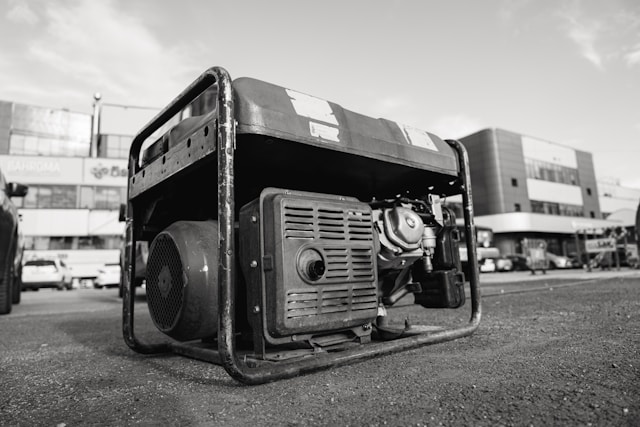In today’s world, power outages can easily disrupt normal life; hence, the need for a reliable generator is a very important investment for homes and businesses alike. From keeping your home running during storms to supporting heavy equipment in a job site or ensuring business operations run easily, choosing the right one is very important. Herein, we discuss everything you’ll want to know about choosing the perfect generator that suits your needs.
Table of Contents
Why You Need a Generator?
They also work during unexpected and sudden power losses. In emergencies, generators cannot be replaced; they ensure that the refrigerator will keep your food from spoiling, the heating system is at an efficient temperature, and the lights are on at your house. Many businesses utilize them so they won’t incur significant financial losses while maintaining their customer satisfaction to a maximum. Besides being used in emergencies, generators could be essential for locations far from any grid power supply, such as building areas and outdoor events.
Before contacting https://www.ablesales.com.au/diesel-generators-cairns.html, identify why you need a generator to determine the right one for your circumstances.
Types of Generators
There are numerous types of generators, and each may apply to different uses. Learning these types could narrow your choices to pick one:
- Portable Generators: Portable generators are versatile, easy to move, and suitable for temporary needs. They normally come into play during short-term power outages or even for outdoor activities like camping. These run on gasoline or propane and can operate some appliances simultaneously, although they are limited in capacity.
- Standby Generators: Standby generators are permanently installed and automatically turn on in case of an outage. They are hardwired into your home’s electrical system and fueled by natural gas or propane. Generally speaking, they work best for those homeowners or businesses that rely on uninterrupted power to keep critical systems running, such as medical equipment, security systems, or refrigeration.
- Industrial Generators: These generators have been constructed to execute heavy-duty operations in several fields, such as factories, hospitals, and construction sites, among others. Most industrial generators are designed to operate on diesel for durability and strong performance.
Critical Factors to Consider
Power Requirements
The most important thing when choosing a generator is understanding your power needs. Calculate the total wattage you will need for appliances and devices you want to use. List your essential items- refrigerators, lights, heaters, and medical equipment- and note their watt requirements. Most generators will have two numbers listed: running wattage capacity and surge wattage capacity. A good model should satisfy both your needs and leave a little room for other additional devices.
Type of Fuel
Generators can run on various fuels: gasoline, propane, diesel, and natural gas. All these fuel types possess a few disadvantages and advantages.
- Gasoline-run generators are pretty easy to find in most hardware stores but quite expensive to operate in the long run.
- As a cleaner-burning fuel, propane comes in tanks that demand proper storage.
- Diesel is efficient, more economical to run in the case of large-scale generators, and noisy at times.
- Natural gas provides convenience with standby generators on tap to your home’s gas line but isn’t an option for a remote location.
Portability
Think firstly about whether to get a stationary or portable one: Portable generators are lightweight and can easily be taken with you into any outdoor action or temporally satisfy your electrical needs; the standby and industrial generators come as stationary devices that usually offer larger capacities for permanently installed or heavy-duty usage applications.
Runtime and Efficiency
Runtime is when a generator can run on a full fuel tank. This is where preparation for extended outages becomes especially important. High-efficiency models will consume less fuel while delivering consistent power and save you money by not needing to refuel as often.
Noise Levels
This could be a big determining factor, especially for residences. Inverter generators are considered quiet and ideal for indoor and outdoor activities on the spot. For its larger version, look for models possessing noise-reducing qualities to reduce disturbance.
Safety Features
Safety should never be compromised. Features to observe in a generator could include overload protection, automatic shutoff, and carbon dioxide detectors. Adequate fume ventilation is required to steer clear of deadly fume accumulation.
Choosing the Right Size Generator
Sizing a generator properly is important to get the one that will meet your needs but not overload. Generators come with different rating capacities in watts, and their rating is differentiated, specifically on how much is needed for a device to start as opposed to how much the engine needs to keep a certain device running. Using this example, a refrigerator may require 1,200 starting watts but 200 running watts. Suppose one intends to power more devices using the generator. In that case, all those values added together should eventually give a clearer view in identifying the size of the generating equipment a person needs. If you are not sure, it is always best to consult with a professional so that you do not undersize or oversize your generator.
Maintenance and Long Life
Like any machinery, generators require periodic maintenance to be relied upon. Basic maintenance involves checking oil levels, checking filters, and ensuring the fuel system is clean. Standby generators should be serviced professionally once a year, while portable ones will need more frequent checks, especially if used frequently. Buying from a reputable brand with a good warranty also affects durability and reliability.
Cost versus Value
Generators can range in cost from several hundred dollars for small, portable units to several thousand dollars for industrial models. While that is a major factor in their purchase, one must weigh it against value over time. A less expensive generator might save money upfront but be much more costly in fuels or repairs over time. Look to reliability, efficiency, and warranty coverage to make your investment go as far as possible.
Generator selection involves determining your needs regarding power requirements, budget, and applications of the intended generator. It thus requires serious thought in identifying the appropriate kind, reviewing some very key features, factoring maintenance requirements into one’s thought process, and therefore being very sure one selects the right type that best suits your power requirements, whatever might be your reasons for choosing it: whether at home, the workplace, or simply outside. A well-chosen generator would provide great convenience and ensure your safety outdoors or inside while offering quiet peace of mind in all ramifications. Start your journey today by assessing your requirements and exploring the wide range of options available on the market.

